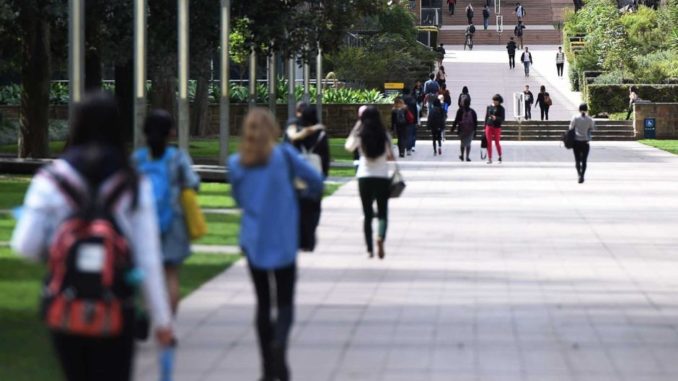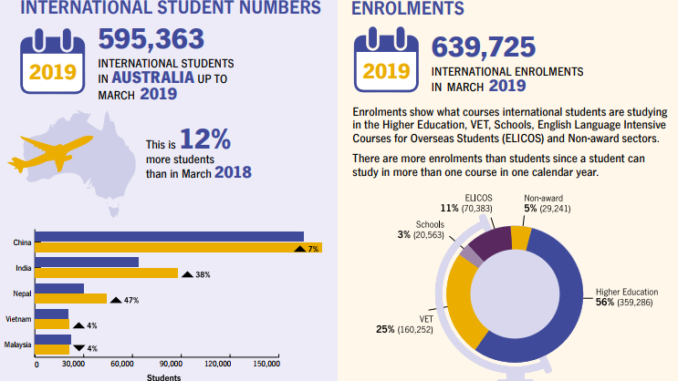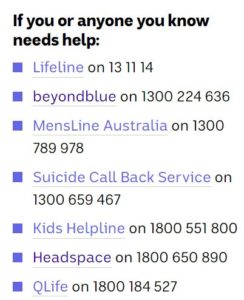
In January this year, Victoria’s Coroner reported that international students are more likely to commit suicide than Australian-born students.
That information was contained in a Victorian Coroners Prevention Unit (CPU) report which examined 27 international student suicides, and which showed that only 22 % of them sought professional support before their suicides.
In contrast, 57% of Australian-born students attended a mental health service for help before they ended their life.
Now with the government promising more funds for mental health services and new research showing a significant increase (12 %) in the number of international students coming to Australia in the last year (see below) it’s critical for international students to know how to seek support to maintain their mental health.

‘It’s a war fighting yourself’
Youqing You, a Finance major from Taiwan, was struggling mental illness during semester and applied for Special Consideration after her mid-semester exam.
She said she had experienced exam pressure in the past, but did not attach importance to it.
“I suddenly felt like my mind was disordered and not able to organise any complete sentences during the exam,” she said.
“I went to the medical centre, and the doctor diagnosed me as ‘totally unable to learn’ because of depression and anxiety. Then I realised how serious it was.”
After reading a story of overcoming mental distress posted by an international student on ABC life, she felt able to share her similar experience.
“At the beginning, I just couldn’t sleep well. I’ve always been worried about my grade and how people think of me.”
“Then, I felt lonely. I have few opportunities to make friends because what I’m studying relies on independent study. I spent most of my time at the library.”
Youqing said that being aware of mental health is just the first important step. International students should seek help and access support once they start to feel insomnia, depression and anxiety.
“I understand academic performance sounds more important than some negative emotions, but do not ignore your personal feelings.”
“It’s a war fighting yourself. You should be brave to speak up and seek help. Then you are more likely to survive.”

‘Good and stable mental health must be a priority for international students’
Ashley Craig, Professor of Behavioural Sciences at the University of Technology, Sydney, said mental health is significant for a good quality of life for everyone, including international students.
“Without it, wellbeing suffers enormously.”
Craig said international students face specific challenges that result in mental distress.
“That may include feeling lonely, financially stretched, sometimes having conflicts due to living in a foreign country and language difficulties.”
He said pressures of the course and exams are the common fears and stresses of studying at university for international students.
Craig said that sleep quality and physical exercise are crucial to achieving a balance between mental health and academic work.
“To make sure you sleep well most nights, physically exercise regularly at least 30 minutes for 4-5 days each week,” he said.
It is also essential to not be isolated and to maintain connections with society.
“Remain socially active, keep in touch with family back home, eat regularly and balanced, and do things you enjoy regularly.”
According to Craig, students do have easy access to counselling and advice because many universities have taken actions to promote mental health already.
Craig also has recommended that universities should give international students information about mental health in the beginning of their courses.

‘To open up about mental health problems’
Non-profit organizations are also putting their effort into maintaining and improving mental health.
Katherine, a moderator of eheadspace, ran an online group chat for international students to be aware of mental health services and to feel equipped to use them.
Headspace is the National Youth Mental Health Foundation which provides professional mental health services to young people between the age of 12 and 25.
It has launched over 100 headspace centres across Australia and provided online support to increase accessibility.

Katherine encourages international students to speak up about their mental distress.
“Most students will not talk about it with others when encountering mental health issues, even with a family member.”
However, she said it’s essential for international students to seek counsel with professionals.
“The only thing you need to do is to open up about your mental health problems and contact your local centre. We are happy to help you!”
There is a free application with the same name, Headspace, to help people reduce pressure, release mental disorder and sleep better.
Other organisations, such as Beyond Blue and Black Dog Institute, provide mental distress support and suicide prevention and information about the latest mental health research.
To survive in the battle of maintaining mental health, international students need to seek help and attend health services in universities or organisations.
To find a Headspace centre near you, please click here!
Are you an international student who has suffered from insomnia, depression and anxiety? Please comment to share your experience with us.




Be the first to comment